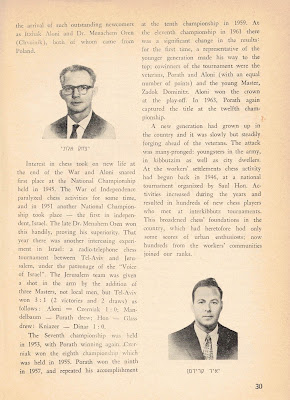
Source: see below
It is sometimes not clear whether a certain player is Jewish or not. That depends on one's definition of "Jewish." Bobby Fischer was undoubtedly Jewish according to Jewish law since his mother was Jewish, but there is no need to restate here his well-known antisemitism. On the other hand, Garry Kasparov is not Jewish according to Jewish law, since only his father was Jewish, but he never denied his Jewish origins. One interesting case is that of Vasily Smyslov, who apparently has some Jewish ancestry but was is not, nor claimed to be, Jewish.
We have noted before on this blog that Palestinian or Israeli chess writers had a tendency to "convert" any player with any Jewish ancestry to Judaism. But has the accuracy improved in the age of the internet? Is the internet used well or badly?
As a casual beginning, we have looked at two interesting web pages. One of them is
Aish (short for
Aish Ha'torah, "the fire of the Torah"), the website of a well-known Jewish education and advocacy organization. It has a surprisingly well-researched general article about Jews and chess, as noted in the link given, from which the picture above is taken. In particular, it distinguishes fact from fiction: it notes that the stories about chess in the Talmud are not true, and that the story of a chess-playing Jewish pope is obviously a legend. Still, it is not fully accurate, for example claiming that Smyslov is a Jew.
Another website is the humorous
Jew or not Jew website. The site rates "how Jewish" a person is not just based on Jewish law but on how Jewish they see themselves, based on their public utterances, as well as the obviously subjective "how much we want the person to be a Jew in the first place" due to their achievement, as their "About the Jew Score" page explains. What
is surprising is that this light-hearted website actually has most of the facts about Jewish or non-Jewish chess players correct.
For example, while "blaming" Kasparov for "losing for a computer" which will lead to a future when "we're all enslaved by machines," they are quite correct about his original name and family origin. They are also openly skeptical about Smyslov's Jewishness, noting that "nobody knows for sure" whether he has Jewish ancestry (not quite true - but at least they do not simply assume he is Jewish). They also note that despite rumors about Spassky's Jewish parentage, that is not the case.
I have deliberately chosen sites whose chess-related articles make no pretensions of being works in chess history, but are intended instead for readers primarily interested in Judaism, not in chess. It is somewhat surprising to see that just here, where one would least expect it, the actual chess history content is reasonably accurate.
Perhaps, after all, as
Edward Winter notes more specifically about
Wikipedia in his most recent feature article, "general" chess information on the internet - while still full of dross - at least shows signs of improving, both in the case of specific good articles and in the removal of mistakes that are pointed out. The problem, notes Winter, is that as always, "chess history suffers when Wikipedia entries make do with references to obviously sub-standard sources."
One example is the article about
Spassky in Wikipedia. While the article has over 140 entries, almost all are from other online sources, without any indication to the reader about those sources' reliability. Compare this to what Winter justly calls a "fine article" about
Hugh Myers, where the many references are almost all to the original primary sources - or to Winter's own well-regarded web
Chess Notes.





